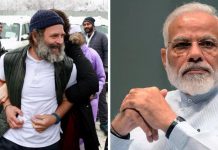
Yesterday, a hopeful BJP began their morning with a premature celebration which only made them look foolish as the day went by. Aam Aadmi Party swept the elections with 62 seats out of 70.
The Delhi elections, in a way, have shocked the BJP. Especially for their leaders who lived in a utopian world where lotus bloomed everywhere except in Jamia, JNU and Shaheen Bagh.
Leading up to the elections, it was clear that this election mattered more to BJP than AAP. Post the defeat in Jharkhand and the embarrassment in Maharashtra, Delhi was meant to be a sort of redemption. Up against one of the only few credible oppositions, BJP had an opportunity to oust AAP and stand tall as the lone party of good governance.

Less than a year ago, in the Lok Sabha elections, BJP had whitewashed AAP by winning all the seven seats from Delhi. They are also holding the office of Municipal Corporation of Delhi where the routed AAP yet again. Winning the Vidhana Sabha meant Delhi, the capital was under their complete control.
While there are a couple of factors that led to the defeat of the BJP, one must acknowledge the fact that BJP isn’t anymore the party that came to power fighting on development in 2014. The BJP that went onto win gaining states since 2014 is now struggling to hold its own battlegrounds.

The outdated strategy: Instead of creating a wave of insurgency through their campaign, the BJP, under the leadership of Amit Shah and Manoj Tiwari once again became the victim of their own divisive agenda. The talk of Ram Mandir, Citizenship Amendment Act and Article 370 sure has a weightage of its own but it always will weigh less against the interest of an individual in the larger scheme of things.
The interest of the nation is, without a doubt, effective to stir emotion among the mass but Delhi has proved yet again that the interest of the nation should lie in the development of each life.
If you closely observe the kind of politics BJP and AAP subscribe to, you can classify them as politics of community and politics of an individual respectively. The politics of communities aim at bringing a community under a common cause and thereby making them vote for the cause. This is where the BJP is strong and hence they are much fiercer in the Lok Sabha elections. The kind of politics that targets the
life of an individual is the politics of AAP and it is the one that has been upheld by the people of Delhi.

‘Sabka Saath, Sabka Vikas aur Sabka Vishwas’ – the slogan that apparently describes the Narendra Modi brand of politics began to alienate communities leading up to this election.
It started with the anti-CAA protests. Instead of handling it gracefully by opening up dialogue with the protestors, the leaders of the BJP were quick enough to alienate them from the idea of their India. Similarly, the biggest mistake of BJP in this election was to take on the students. The way Delhi Police that reports to the Home Minister Amit Shah handled the students sent a clear message to the Delhi student community. Those students who were fence-sitters were forced to repel the BJP by this.
This election is a lesson for the BJP and for the rest of the parties across the country. Despite getting a 38 percent of votes, BJP ended with 8 seats. It is time for them to re-structure their political strategies. It is time to discard the politics of division. It is time BJP comes of age in the true sense.


































